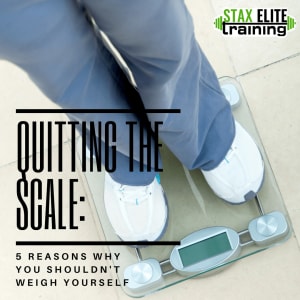
Before you read any further, stop whatever you're doing and remind yourself that HARD WORK PAYS OFF.
And speaking of hard work, losing weight is hard work. It involves being consistent, dedicated, and patient, which we all know is a virtue ;-)
And if you're like most people, you want to see results almost immediately that justify your hard work. And for most people, those results have to do with seeing that number on the scale go steadily down. So what do you do? You weigh yourself. Even though you know you shouldn’t, you weigh yourself every day because you need a reason to keep motivated.
Everything is fine until the unthinkable happens: the number on the scale stops going down. And you think, “WHAT?! Everything I’ve done for the past few weeks is for nothing!” Repeat this a few times and before you know it, you’ve given up on working out and your diet.
Sound familiar?
The truth is, you were probably doing a good job before you quit. But you got discouraged because you did what no one should ever do: you weighed yourself too much and read into it too much.
Plain and simple - weighing yourself every day is too much. Even every few days is too much.
Here's 5 reasons why your scale misled you and threw your whole plan off course:
1. You’re confusing “weight loss” with “fat loss”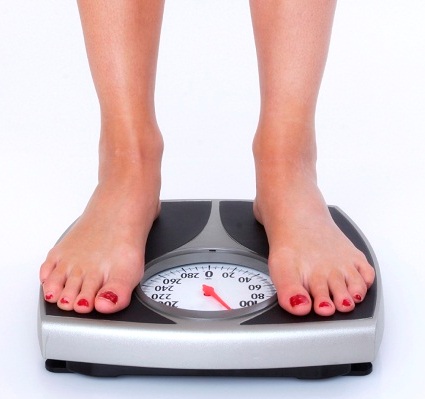
It’s probably safe to assume that when people want to lose weight, what they really mean is that they want to lose fat. The problem is, many people use the words “weight loss” and “fat loss” interchangeably, which are two separate concepts.
Losing overall weight isn’t hard – if you go to the gym and don't pick up a single weight, you just sit in the sauna for a while you’ll drop a few pounds. Fat loss is harder to achieve because it depends on several factors, and it takes more time than you think to truly lose it. Here are a couple key points about fat loss to consider:
When you lose weight, you lose more than just fat.
Muscle and water are two other components that make up your weight, and when you lose weight, you can lose some of each. How much of each you lose depends in part on how much fat you have to lose when you start. Overweight people have more to lose than thin people, and they will lose more weight from fat than muscle than thin people.
You can drop weight but dropping actual fat takes time – more time than you think.
Many people set fat loss goals for themselves that are unreasonable. And without going on an unhealthy near-starvation diet, you can only expect to lose 1-2 pounds of fat per week at best.
Don’t expect to lose 10 pounds in a week, because even if you do, that weight is not going to be all fat. Losing muscle is not good for your health, and you'll want to preserve it as much as you can.
But what about the people who do claim to lose 10 pounds in a week? There are reasons for this, beginning with…
2. Your glycogen levels are changing, which can cause large weight swings in either direction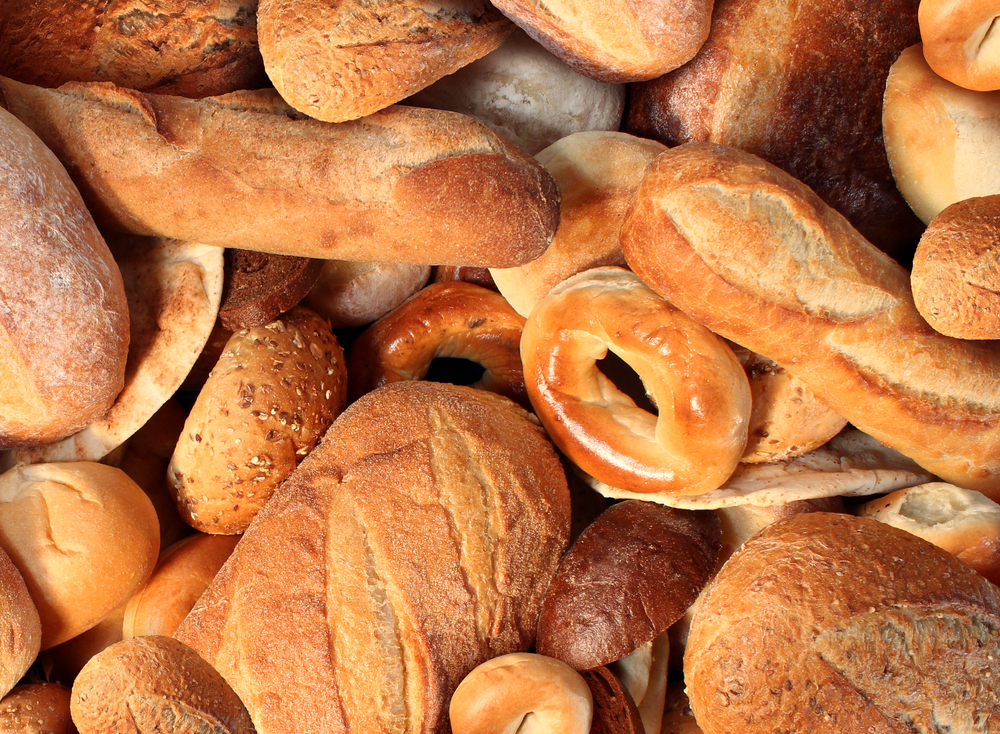
Glycogen is a short-term energy source that your body uses when it needs immediate energy. Although it's produced from many different types of foods, foods rich in carbohydrates like bread trigger glycogen production more than any other food source. It’s a very good energy source, so much so that it's the major reason why marathon runners “carb load” the day before a race: so they can fuel up on glycogen.
However, in terms of your weight, glycogen has a very interesting attribute: 3 to 4 grams of water will bond to each gram of glycogen. You always knew that diet played a big role in both fat and weight loss, but once you understand the role glycogen and water have with each other, a lot of things will make sense to you. For example:
This is why people lose weight on carb-restricting diets like the Atkins diet
The Atkins diet and other diets similar to it (ketogenic, paleo, etc.) revolve around one major concept: restricting carbohydrates, and by extension, glycogen. Once your glycogen levels become depleted, there is less water for the glycogen to bond to. This is why many people who go on ketogenic-style diets appear to lose a lot of weight very quickly: much of the initial weight loss is simply water.
This is why people believe they’ve “gained it all back” after cheating on their diet.
Here’s a common situation that most people have probably experienced at least once: after going on a strict diet for a couple of weeks and being careful with everything you eat, you treat yourself to a weekend where you eat whatever you want because you feel like rewarding yourself.
On Monday, you stand on the scale, and you’re 5 pounds heavier. You get upset, you become frustrated, and you feel like all your hard work was wasted. Good news: you didn’t waste any of your hard work! It’s glycogen that’s fooling you.
It’s deceptively easy to refuel yourself on carbohydrates and replenish your glycogen levels. A typical endurance athlete, for example, requires around 500-600 g of carbohydrates a day to perform at optimal levels.
500-600 g of carbohydrates might sound like a lot to you at first, but consider that unless you actually are an athlete, your carbohydrate needs will be a lot less. Add this to the fact that:
One wheat bagel = 48 grams of carbs (not including anything you put on it)
One slice of cheese pizza = 35.66 grams of carbs (and lets be honest, it's pretty difficult to eat only one slice)
One serving of lasagna with meat = up to 40 grams of carbs (again, just one piece?)
One cup of steamed white rice = 45 grams of carbs
One 12oz can of soda = 35 grams of carbs
As you can see, many popular foods are so rich in carbs so it’s pretty easy to refill your glycogen stores in a day if you aren’t watching your carb intake, or if you're choosing not to for a special occasion.
By refueling on carbs, you’re replenishing your glycogen levels, and water is binding to it. So, you haven’t ruined your goals; you’ve probably just put on water weight. Watch how fast you will lose this weight again if you reduce your carbohydrate intake.
However, glycogen isn’t the only molecule that can retain water. There are others that influence your water and your weight, which brings us to the next point…
3. You’re retaining water due to your salt intake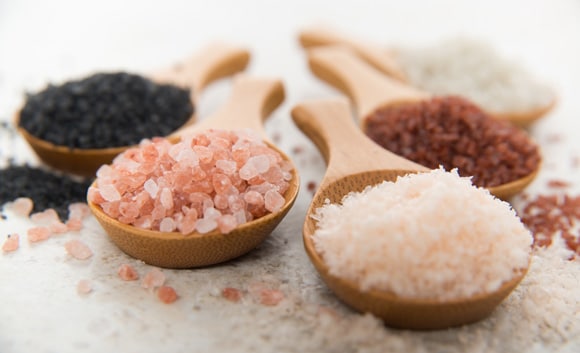
Salt (or more accurately, sodium) is everywhere and extremely hard to avoid. It might not surprise you that a single patty cheeseburger contains over 500 mg of sodium (nearly a quarter of the daily recommended levels), but would you be surprised to know that the ranch dressing you’re putting on your salad contains over half that, as much as 270 mg? Or that a tablespoon of soy sauce that you’re using in your healthy, vegetable-only stir-fry has 879 mg of sodium?
Sodium is linked with water retention, and it's the job of your kidneys to expel unneeded sodium out of your body. Until your kidneys are able to do that, you will temporarily be holding onto extra water. If your daily water and sodium intake habits change from day to day, this can be why your holding onto differing amounts of water, which will cause changes in your daily weight.
So, if you were on a diet but consumed more salt than you normally would have, you can expect to see a temporary increase in weight. It doesn’t mean that all your hard work is for nothing; it just means that you’re experiencing additional water weight because of the extra sodium in your body.
However, there are other factors aside from diet that can lead to fluctuating weight on the scale, including…
4. Your muscle gains are outweighing your fat loss
If lifting weights is part of your strategy to burn fat and lose weight, you’re doing something right! Adding resistance training to your fat/weight loss plan is a great way to protect and preserve muscle loss as you remove fat from your frame.
However, if you’re new to weightlifting and you’re pushing yourself hard, you’re going to see some things on the scale that may surprise you. Your weight might actually not go down; it might go up!
This is because as you're losing fat, and replacing that weight with muscle. Your weight may not go down, but your body fat percentage will.
For example, let’s take a 117-pound woman and assume she has 38.6 pounds of fat mass, 78.4 pounds of Lean Body Mass, and 42.3 pounds Skeletal Muscle Mass. That’s consistent with a body fat percentage of 33%, which is slightly over the normal range for women (which ends at 28%).
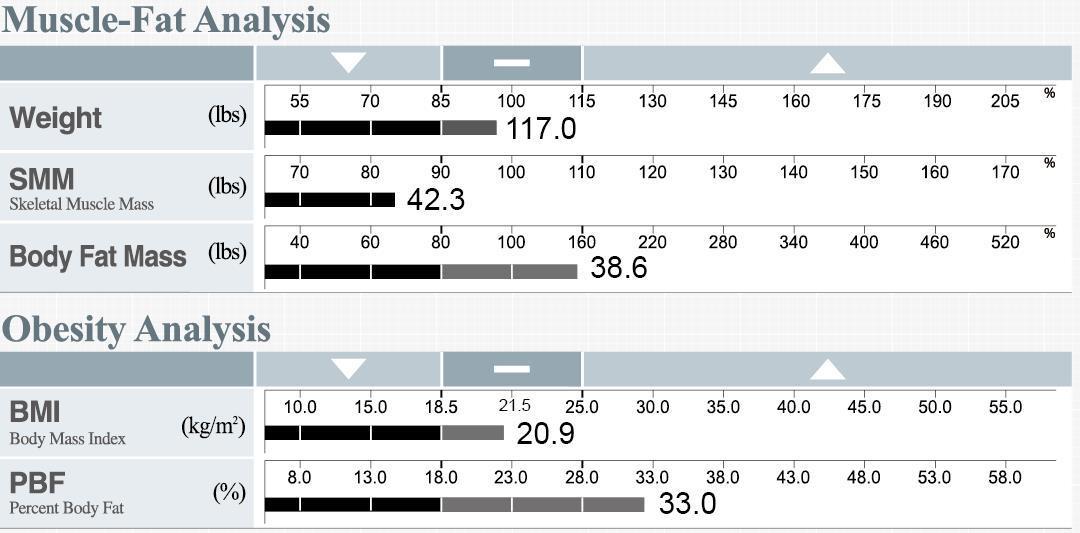
Now let’s take that same woman and say that she begins a comprehensive fat burning program that includes dietary changes, cardio, and strength training. After 3 months, she now has 32.6 pounds of fat mass 84.4 pounds of lean body mass due to a 66-pound increase in Skeletal Muscle Mass. She still weighs 117 pounds, but now her body fat percentage is 27.8% – a big drop from her previous result of 33%, which brings her into the normal/healthy range.
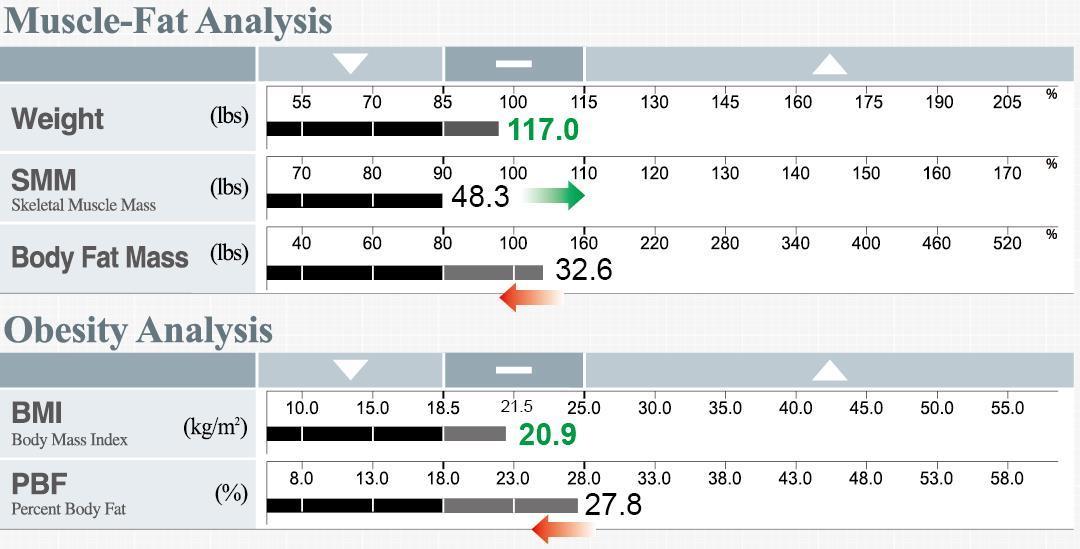
You may be thinking right now “Oh, but this woman would know that her efforts were successful because she should look different and feel different with a loss of 6 pounds of fat mass.” But remember, it took her three months to get there.
Do you think she would've looked and felt different right away, with only a scale to measure her progress? Without measuring your body composition, would she have known that she was making any progress after, say, one month? After 6 weeks?
You can imagine the frustration she could have felt by not seeing the scale move at all. This is why measuring body composition is so important.
These first four points all lead to one unifying, very important reason why you shouldn’t weigh yourself every day, which is…
5. You’re weighing yourself at different times of the day, under different conditions
If you’re weighing yourself whenever you feel like it without being consistent in terms of what time you weigh and what you’ve done during the day up to that point, the scale is going to mislead you every single time.
Generally, people’s weight increases during the day due to the food and drinks they consume. Food and drinks also produce waste, which can also lead to additional weight gain throughout the day. Naturally, this weight gain is temporary, but if you weighed yourself in the morning on an empty stomach, and then without thinking weighed yourself 5 days later in the middle of the day, you can’t compare those weights against each other.
Also, if your diet has changed in between your weigh-ins, that can cause significant weight changes. Did you eat an unusually large amount of carbs the day before? You could potentially see very large swings in your weight. But if you remember how glycogen bonds with water, this won’t bother you anymore because you’ll understand that it’s just water weight.
Did you just finish exercising? You probably lost some water, leading to temporary weight loss. Were you drinking water while you were working out? Your muscle cells may have absorbed some of it, causing your weight to respond accordingly.
Don’t let the scale trick you!
There are so many things that can affect your weight, so you should never get into the habit of weighing yourself every day. So if not that, what should you be doing?
- Look for consistent, steady, and gradual changes in your weight every 2 – 4 weeks
As difficult as it sounds, if you are using just a scale to determine your progress, you have to space out your weigh-ins. If you still aren’t seeing weight changes in that period of time, you need to take another look at your diet and exercise plans and potentially make some adjustments.
- Get your body composition analyzed and track your body fat percentage
Because your weight is made up of many different elements and can fluctuate for so many different reasons, assessing your weight by tracking your body composition is a much better way to determine how you’re meeting your goals.
Moral of the story: Don’t let the scale trick you! If you diet and exercise properly with enough patience and determination, you will reach your goals.



